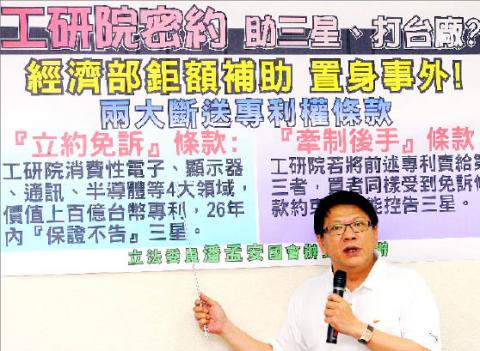The government-funded Industrial Technology Research Institute (ITRI, 工研院) denied yesterday that its patent lawsuit settlement with Samsung Electronics Co last year has negatively affected the interests of Taiwanese companies.
However, ITRI president Shyu Jyuo-min (徐爵民) refused to disclose the details of the settlement, citing confidentiality.
The ITRI’s denial came after Democratic Progressive Party (DPP) Legislator Pan Men-an (潘孟安) yesterday accused the Hsinchu-based research institute of signing unfair agreements with Samsung to settle several patent lawsuits, citing a report by the Chinese-language Wealth Magazine (財訊).

Photo: Chang Chia-ming, Taipei Times
The magazine reported that the settlement could affect patent rights that local companies, including flat panel maker AU Optronics Corp (友達光電), purchased from the institute.
In June and October of 2009, the ITRI filed a total of seven patent infringement lawsuits against Samsung and its US unit with a US court in Arkansas.
Citing the magazine report, Pan told a press conference yesterday that the ITRI settled the lawsuits with Samsung last year for less than NT$2 billion (US$70 million), while authorizing Samsung to use more than 100 of its patents.
However, under the settlement, the ITRI also signed an agreement with Samsung not to sue, agreeing not to pursue its patent claims against the South Korean firm in the fields of consumer electronics, flat-panel displays, -communications and semiconductors where the institute now owns patents or is applying for patents over the next six years, Pan said, citing the magazine report.
If the ITRI sells these patents to a third party, the third party should also not sue Samsung, according to the report.
Pan said the number of patents included in the covenant not to sue accounted for about two-thirds of the ITRI’s roughly 14,000 patents, worth more than NT$10 billion.
As these patents are valid for 20 years, the signing of the agreement not to sue would mean Taiwanese firms could not pursue patent claims against Samsung for the next 26 years, thus posing a huge threat to local electronics firms, Pan said.
Pan said he would ask the Ministry of Economic Affairs and the ITRI to submit a special report on the settlement to the legislature.
In response, Shyu said that the ITRI did not agree to sell patents involved in the settlement exclusively to Samsung when it reached the deal last year with the South Korean company, which is seen as a rival by local electronics companies. Nor did the ITRI ink any deal with Samsung on cross-licensing, he added.
In a statement, the ITRI described the accusation as “false” and said that it has continued to work closely with local companies in patent lawsuits and technology development.
The ITRI, which said it was considering taking legal action against Wealth Magazine, said the report has caused a “major impact” on the ITRI’s ongoing lawsuit against LG Electronics Inc of South Korea.

Shares in Taiwan closed at a new high yesterday, the first trading day of the new year, as contract chipmaker Taiwan Semiconductor Manufacturing Co (TSMC, 台積電) continued to break records amid an artificial intelligence (AI) boom, dealers said. The TAIEX closed up 386.21 points, or 1.33 percent, at 29,349.81, with turnover totaling NT$648.844 billion (US$20.65 billion). “Judging from a stronger Taiwan dollar against the US dollar, I think foreign institutional investors returned from the holidays and brought funds into the local market,” Concord Securities Co (康和證券) analyst Kerry Huang (黃志祺) said. “Foreign investors just rebuilt their positions with TSMC as their top target,

H200 CHIPS: A source said that Nvidia has asked the Taiwanese company to begin production of additional chips and work is expected to start in the second quarter Nvidia Corp is scrambling to meet demand for its H200 artificial intelligence (AI) chips from Chinese technology companies and has approached contract manufacturer Taiwan Semiconductor Manufacturing Co (TSMC, 台積電) to ramp up production, sources said. Chinese technology companies have placed orders for more than 2 million H200 chips for this year, while Nvidia holds just 700,000 units in stock, two of the people said. The exact additional volume Nvidia intends to order from TSMC remains unclear, they said. A third source said that Nvidia has asked TSMC to begin production of the additional chips and work is expected to start in the second

REVENUE PERFORMANCE: Cloud and network products, and electronic components saw strong increases, while smart consumer electronics and computing products fell Hon Hai Precision Industry Co (鴻海精密) yesterday posted 26.51 percent quarterly growth in revenue for last quarter to NT$2.6 trillion (US$82.44 billion), the strongest on record for the period and above expectations, but the company forecast a slight revenue dip this quarter due to seasonal factors. On an annual basis, revenue last quarter grew 22.07 percent, the company said. Analysts on average estimated about NT$2.4 trillion increase. Hon Hai, which assembles servers for Nvidia Corp and iPhones for Apple Inc, is expanding its capacity in the US, adding artificial intelligence (AI) server production in Wisconsin and Texas, where it operates established campuses. This

Garment maker Makalot Industrial Co (聚陽) yesterday reported lower-than-expected fourth-quarter revenue of NT$7.93 billion (US$251.44 million), down 9.48 percent from NT$8.76 billion a year earlier. On a quarterly basis, revenue fell 10.83 percent from NT$8.89 billion, company data showed. The figure was also lower than market expectations of NT$8.05 billion, according to data compiled by Yuanta Securities Investment and Consulting Co (元大投顧), which had projected NT$8.22 billion. Makalot’s revenue this quarter would likely increase by a mid-teens percentage as the industry is entering its high season, Yuanta said. Overall, Makalot’s revenue last year totaled NT$34.43 billion, down 3.08 percent from its record NT$35.52